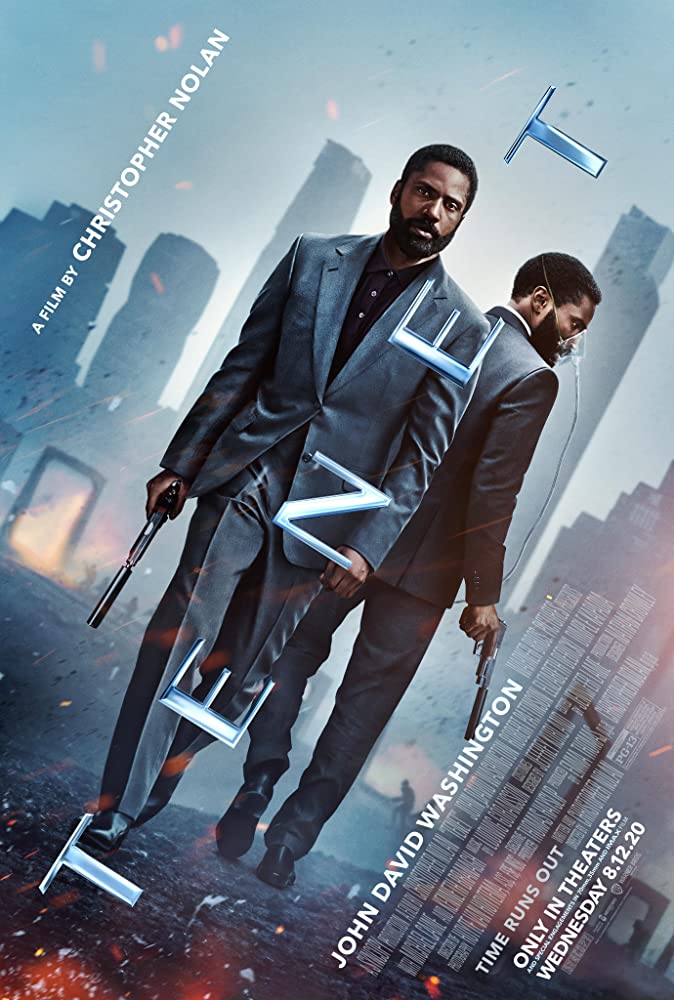Before I go much further, my screening needs to be addressed. While the option to see Tenet in a traditional brick and mortar theater was available, I did not see it in an indoor setting. Despite coronavirus related restrictions being pulled back for indoor businesses like multiplexes in my area, I don’t feel comfortable sitting in one place for 150 minutes with strangers who aren’t likely to consistently wear a mask as they eat concessions. Instead, this theatrical experience was at a local drive in. Where the screen had several indentations. Which were illuminated multiple times by fellow patrons unable to control the headlights. With my personal high quality portable radio as my sound system. While sitting in a $10 lawn chair in front of my car. Clearly, this was not the theatrical experience writer/director Christopher Nolan intended. I’m sure if I described this scenario to him, he would melt like nitrate film in extreme heat.
All of this is to firmly establish my viewing of Tenet may not have been optimal. For a film as heavily dense in exposition, twisty plot elements and elaborate action set pieces, there’s plenty that can be missed between the lesser presentation and copious amounts of distraction. Yet, in our modern world where movie theaters aren’t that safe a prospect and are gradually re-closing due to lack of business, the options are limited for any cinephile. Short of waiting for a digital or physical release at home, one either foolishly braces going to an indoor theater during a global pandemic (I repeat, foolishly and add not recommended by this writer) or goes to an outdoor projected screening and hopes for the best. So, I’ll try my best to give my thoughts on what I saw and give those few – based on the box office returns over the last month the film has been in release – wanting a safe big screen experience my best summation of it without spoiling any major plot threads.
Tenet is a time travel story. Both in the most traditional structural terms and untraditional methods. For this story, time travel follows the conceit of being “Inverted” – in which a person travels backward in time witness objects and people moving backwards as they move toward backwards to their original point of time traveling. Sounds confusing? Well, the film acknowledges this early on. When our protagonist – referred to as… The Protagonist (John David Washington) – is recruited to the titular organization who is trying to save the world from those using this Inverted time travel technology for nefarious purposes as prompted by villainous forces from the far future, he meets with an exposition trainer character named Barbara (Clémence Poésy). After explaining this conceit with a bullet that moves backwards, she distinctly states “Don’t try to understand it. Feel it.”
While this is mainly meant as a way to calm our lead character, it clearly feels like a helping hand by Christopher Nolan to the audience. Even though this Inverted concept is so inherently convoluted, he is trying to balance it with enough thrilling visuals and exciting action to make it an accessible summer blockbuster. Which has been his brand since he took Batman from Joel Schumacher silliness to a more grounded crime drama driven morality tale with his trilogy. Even while juggling the varying levels of dream logic in Inception or the stringing along of tricks to a shocking twist in The Prestige, that balance was satisfied quite well. With Tenet, there’s no real shortage of kinetic action. From an opening opera raid scene to a war film scaled climax, every cent of the $200 million budget is on the screen. Yet, Christopher Nolan’s modus operandi has often been this conflict between delivering the palpable emotional highs of a blockbuster while having a sleek cold aesthetic the can be at odds with much of anything emotional.
Unfortunately, that emotional journeys of Tenet seem to get bogged down both in the convoluted premise and in the auditory sense thanks to an oppressive sound mix. The connections our protagonists builds with a suave yet enigmatic agent Neil (Robert Pattinson), brooding Russian arms dealer Sator (Kenneth Branagh) and the stylishly calculating art dealer Kat (Elizabeth Debicki) consistently feel contrived for the overall puzzle piece structure of the story. It’s not a dismissal on any of the actors who all accomplish the sleek spy style mystique and deliver a few one liners as is asked of most folks cast in a Nolan movie. Even with Branagh’s silly Russian accent. There are attempts at witty back & forth, earnest family driven motivations and creative shifts of perspective that mostly take a back seat to displays of the Inversion and endless explanation about the plot devices like “Algorithm” and “Plutonium.” Other Nolan films tend to include such explicit exposition and less than subtle familial connections, but usually found an engaging middle ground that Tenet can’t quite grasp. Hence, unlike Barbara’s warning to The Protagonist and to us, it’s quite impossible to either “understand” or “feel” much of what’s going on here.
There’s a clinical nature to the structure of Tenet as a story. Without going into specifics, the beats would be familiar to a beloved time travel film has followed. Yet, other better time travels adjacent films tend to be more self aware of the convoluted nature of their stories and embrace the bizarre nature of the concept in a way that doesn’t tire. With Nolan, there can be brief comedic barbs but no explicitly intentional levity. Instead, there’s so much more unintentional levity in seeing time reverse itself via a rather underwhelming reversal of footage. For example, a hand to hand fight scene between John David Washington and a mysterious Inverted body padded soldier that feels more like a weird YouTube Poop edit of a much better fight scene. Inverted as a gimmick feels so clumsy as a conceit to build suspense especially as Nolan puts his usual gusto into more traditional and gorgeous looking effects heavy beats like an airplane crashing into a building or scaling a building on climbing equipment. That’s not to say the Inverted gimmick never works. A big highway chase sequence in particular shows off Nolan’s penchant for practical stunt work and a bit of visual inventiveness thanks to the Inverted gimmick that’s propulsive and energetic.
Still, by the time Tenet reaches its climax, the self serious nature of this very goofy conceit doesn’t really hold much water. Despite the best efforts of Hoyte van Hoytema‘s crisp cinematography and Ludwig Göransson‘s techno reinvigorating of the traditional overbearing Hans Zimmer style Nolan score, this expensive looking movie feels far too self serious and bogged down in unveiling its allegedly mind blowing sci-fi conceit to consistently entertain. As I prefaced, this could be due to my specific lesser presentation and I want to give it a second chance in a more optimal setting. Then again, Christopher Nolan’s earlier films had odd obfuscating choices even in his most preferred format of IMAX presentation. Like Interstellar‘s abrasive score or The Dark Knight Rises‘ muffled vocals for the villainous Bane. Maybe it’s a sign that Nolan’s style of filmmaking may have grown stale and may be in need of a reinvention. As much as seeing an original story at this scale is encouraging, Tenet feels like most of Christopher Nolan’s tricks on much more wobbly legs. Whatever the cinematic landscape ends up being once the United States finally gets a handle on this pandemic, I don’t want to lose the theatrical experience or distinctive choices from a filmmaker like Nolan. Yet, I hope the befuddling release and final product of Tenet gives us second thoughts as to what will drive and entertain audiences.
Rating: 2.5 out of 5 Algorithm Pieces




